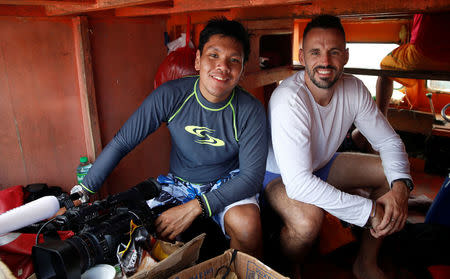A journey to Scarborough Shoal, the South China Sea's 'Waterworld'
By Martin Petty SCARBOROUGH SHOAL, South China Sea (Reuters) - For Filipino fishermen, a trip to the Scarborough Shoal in the South China Sea is an uncomfortable one at the best of times. Graphic: http://tmsnrt.rs/2oxnG2M Hours working in the scorching sun, a monotonous diet of rice, spam and fish, sometimes for weeks, all the while watching for tropical storms that could wreck their modest wooden boats. For a team of Reuters landlubbers making a reporting trip to the disputed shoal, there were other challenges - the lack of any toilets apart from the sea, sleeping wedged on the open deck, and most of all, the constant worry that the Chinese coastguard would try to drive us away. Five years after China forcibly blockaded the rich waters from all but its own fishermen, the visit last week confirmed that Beijing had made concessions. Philippine vessels were allowed to fish again, and small boats could enter the lagoon. But while an international panel last year ruled the shoal should be freely fished by all, China's coastguard was still clearly calling the shots. Graphic: http://tmsnrt.rs/1GHW1LC Alerted to our presence by Chinese fishermen holding cameras and two-way radios, a coastguard vessel sped towards us before losing track of our boat in the mass of similar looking craft surrounding the prized fishing grounds. Months in planning, the 200-km (124-mile) journey from the Philippine coast to the shoal took 18 hours in a narrow, 12m (40ft) fishing boat. Earlier trips had to be cancelled when storms made the crossing too dangerous. On this journey a second vessel was hired to accompany us as a precaution against bad weather or breakdowns. Space was limited on rudimentary wooden boats that are steadied by bamboo cane outriggers held together by reams of fishing line. There's no power, and no roof, just a tarpaulin sheet to shelter from the rain and sun. Enough water, canned meat, rice and fuel were brought to last a week in case bad weather stranded us at the shoal. For journalists, there's also cameras, tripods, life jackets, as well as a satellite phone and small generator to charge batteries. LIFE IN WATERWORLD Our boats approached the area at daybreak. It is an oasis in a desert of water, a huge flotilla of fishing vessels far away from home, lined up with bows pointing towards the bright green shoal. In the distance, a Chinese coastguard ship guarded the mouth of the reef, preventing the larger boats from entering. China and the Philippines have sparred for decades over ownership of this prized lagoon, but with relations improved, Filipino boats now anchor alongside Chinese vessels. We watched as barefooted men in leggings, long-sleeves, caps and gloves trade freely with each other. Using hand signals, they swap cigarettes or fish, in scenes reminiscent of "Waterworld", the 1995 Kevin Costner film, where polar ice caps have melted and post-apocalyptic tribes live on boats. We joined fishermen riding small boats over the damaged coral wall of the lagoon, careful to avoid disrupting men inside who cast nets or spear for fish. Interviews were conducted with masked divers treading water, and we snorkel over the reef with a waterproof camera, checking out the coral and sealife. The Chinese boats are robust, and luxurious compared with those of the Filipinos, some of which are barely more than rafts. Clothes and drying fish were hung from the ropes that hold these craft together, the smell overpowered by diesel fumes. Makeshift wire cages of live lobsters trailed behind. For many Filipinos, trips to Scarborough are swift, seizing what they can during what many fear may only be a temporary truce. But some stay for months, selling their catch to bigger boats, and tapping new arrivals for fresh supplies to sustain them a few days longer. Beijing maintains it has the right to control the shoal, in defiance of the Permanent Court of Arbitration which last year deemed Scarborough a traditional fishing ground for “many nationalities”. China's foreign ministry said this week Scarborough was "an inherent part of Chinese territory" and the coastguard was there to administer fishing and preserve the peace and tranquility. The Filipinos cooperate, but remain wary. "They're not here to protect us," said fishermen Vicente Palawan. "Not so long ago, they were water-cannoning us." (Editing by Lincoln Feast)

 Yahoo News
Yahoo News 



